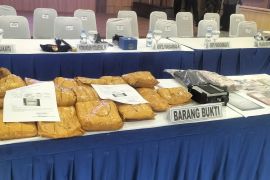"The job of the ministry is ensuring availability," Minister of Agriculture Syahrul Yasin Limpo noted here on Monday.
Thus, 17 tons of chili peppers came from Magelang and Temanggung, Central Java, as well as 125 tons of shallots from Garut and Sumedang, West Java.
Chili peppers and shallots are two kitchen ingredients that are susceptible to experiencing a price hike, especially during the rainy season, as they tend to spoil quickly when stored, thereby impacting the stocks and prices ahead of the Ramadhan month.
Nonetheless, he made assurance that the quality of commodities is safe since the government has utilized artificial intelligence (AI) technology that is capable of monitoring the development of horticultural plants until harvesting.
Moreover, the government looks into post-harvest product handling to ensure longevity that is also crucial to maintain food quality.
In addition to these two commodities, the minister has ensured that rice stocks are available in the market since Indonesia has already entered the national harvest month.
Meanwhile, Acting Governor of Jakarta Heru Budi Hartono expects that the existence of this food supply can control prices in the market.
Despite a slight increase in prices, the merchants stated that they are already stable, he noted.
Commodity supply from the ministry became important to handle prices or inflation, given that Jakarta contributes 28 percent to the national inflation.
Meanwhile, according to Jakarta Food Information as per Monday, the average price of red cayenne pepper in Jakarta had declined to Rp11 thousand as compared to Sunday at Rp78,085 per kilogram.
Moreover, the average price of shallots in Jakarta reached Rp42,851 per kilogram.
Related news: Jakarta entrenching food security by boosting urban agriculture
Related news: Jakarta collaborating with neighboring regions to maintain food supply
Translator: Dewa Ketut S W, Fadhli Ruhman
Editor: Rahmad Nasution
Copyright © ANTARA 2023












